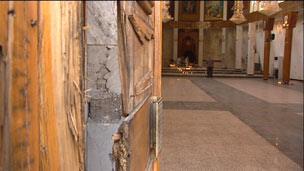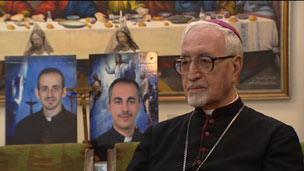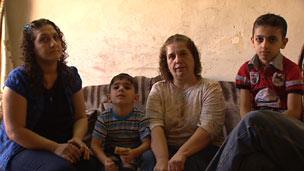Lives of fear for Iraqi Christians
- Published

The Catholic cathedral in central Baghdad has opened its doors again
A week after the worst single disaster to afflict Iraq's Christians in modern times, the Catholic cathedral in central Baghdad where the killing took place was back in business.
With its windows still smashed and walls scarred and pocked by blasts and bullets, the building had been quickly cleaned up in time for a service at exactly the same hour as the killers struck a week earlier.
As the cathedral was being readied for its first service since the attack, a senior Iraqi cleric in London, Archbishop Athanasios Dawood, called on Iraqi Christians to flee the country because it was so dangerous.
"If we stay, they will kill us," he told the BBC after addressing a congregation of Iraqi Orthodox Christians at a service in London.
"Which is better, to flee or to stay? To be killed or to be alive? But when I say 'leave', my heart is injured inside."
But in Baghdad itself, both Church leaders and Christian politicians seemed unanimous in urging their communities to stay.
'Bearing witness'
The Syriac Catholic Bishop of Baghdad, Ignatius Metti Metok, says he lost half his normal congregation in last week's attack on his Cathedral of Our Lady of Deliverance, immediately adjacent to his diocesan headquarters.

Bishop Metti Metok says he cannot force his congregation to stay on
"My people say to me, 'You want us to stay after what's happened? It could happen again, and who's going to protect us?'" he said.
"We tell them, the Church is against emigration, we have to stay here, whatever the sacrifices, to bear witness to our faith. But people are human, and we can't stop them leaving."
Christian politicians have been infuriated by suggestions that their community should leave, and that Western countries should open their gates to an exodus from Iraq.
"This is our home, we have been together with Muslims for centuries, this is our destiny, and we will stay together," said Yonadam Kanna, a prominent Christian member of the Iraqi parliament.
"This is almost parallel to what al-Qaeda is doing against us. Al-Qaeda is pushing us out and you are pulling me out. Which is against my interest, against my people, against my country."
He was particularly angered by what he believed were plans by France to invite 1,000 Iraqi Christians to emigrate there.
"That's against the interests of the Christians, it incites Muslims against us, and it's a departure from European values which deal with people as human beings not as Christians or Muslims," he said.
Offer of sanctuary

This Iraqi Christian family is "afraid all the time"
The French embassy is organising on Monday an emergency medical airlift of about 40 wounded people from the church attack and some helpers to accompany them.
But the French ambassador in Baghdad, Boris Boillon, insisted that the evacuation was a purely humanitarian medical affair and that a separate offer of 1,000 visas to Iraqis in general - not just Christians - was part of a European programme dating back to 2008.
"France has a long tradition going back several hundred years of offering sanctuary to people in danger," he told the BBC.
"But we want Iraq to keep its pluralistic identity, and the presence of the Christians is a part of that identity."
But there are, nonetheless, fears that further waves of emigration could result from the bloodbath at the church.
More than 40 Christians are believed to have died when security forces stormed the cathedral building where they were being held hostage by gunmen who detonated their explosive belts, causing carnage.
Fadya Issa is about to leave the country with her husband, their two young sons and her sister-in-law Samira, to emigrate to the US.
It is not a spur-of-the-moment decision driven by the church attack, though it has made her glad they are going.
It took them two years of waiting to get their American visas.
None of them has ever been out of the country or flown on a plane before. They know they are going to California to meet up with Samira's brother but they do not know where. Between them they have about four words of English.
"Of course, it's sad to leave your homeland, the place you were born and grew up, and all the things you know," said Fadya.
"But what can we do? Here, you're afraid all the time. You're afraid at home, and when you take the kids to school, and when you go to the market. Wherever you go, you're afraid."
Not just Christians
Since 2003 Iraq's Christians, who have lived here for nearly 2,000 years, have dwindled in numbers from an estimated 900,000 to about half that number, though there are no statistics.
"Before the change of regime seven years ago, we didn't have massacres like this," said Bishop Metti Metok.
"Of course we are worried for the future of our community. However much we encourage them to stay, they ask us, 'Will you guarantee our lives?'"
He and other Church leaders pointed out that it is not just the Christians who are targeted and suffering.
Two days after the church attack, around 90 people were killed in a rash of bomb explosions in mainly Shia neighbourhoods.
Shia mosques, pilgrimages and funerals, as well as crowded markets and busy streets. have frequently been attacked by bombers.
- Published7 November 2010
- Published1 November 2010
- Published1 November 2010
- Published1 November 2010